What Does Earth Symbolize Spiritually? Life!
In spiritual contexts, Earth symbolizes grounding, fertility, life, stability, and nurturing. It is often associated with motherhood and is revered as the mother of all life.
Earth represents the foundation of our existence and is considered a source of wisdom and knowledge.
The Earth, in a spiritual sense, carries profound meanings that transcend cultures.
It is emblematic of:
For example, in many indigenous cultures, Earth is often personified as a mother figure, nurturing and caring for her children, a concept popularly known as ‘Mother Earth’ or ‘Gaia.’
Earth’s spiritual symbolism is a testament to its life-giving and sustaining qualities, reminding us of our interconnectedness with the natural world.
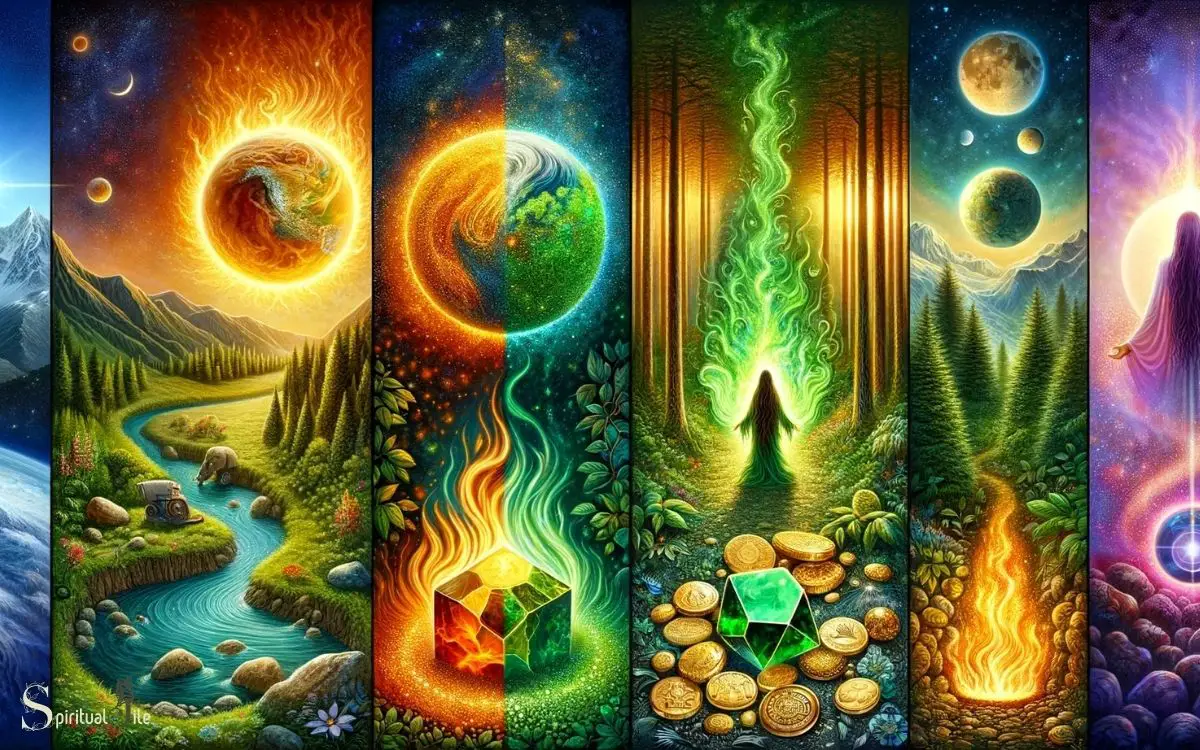
Key Takeaway
Earth as Stability and Grounding

Earth represents stability and grounding in various spiritual traditions and belief systems. It is often seen as a symbol of permanence, strength, and solidity.
In many cultures, the earth is associated with the physical realm and is considered the foundation upon which everything else is built.
This symbolism extends to the idea of being rooted, both physically and spiritually, and finding a sense of security and stability in the midst of life’s challenges.
The earth’s unwavering nature serves as a reminder of the importance of staying grounded and connected to the present moment.
Earth as Nurturer and Provider
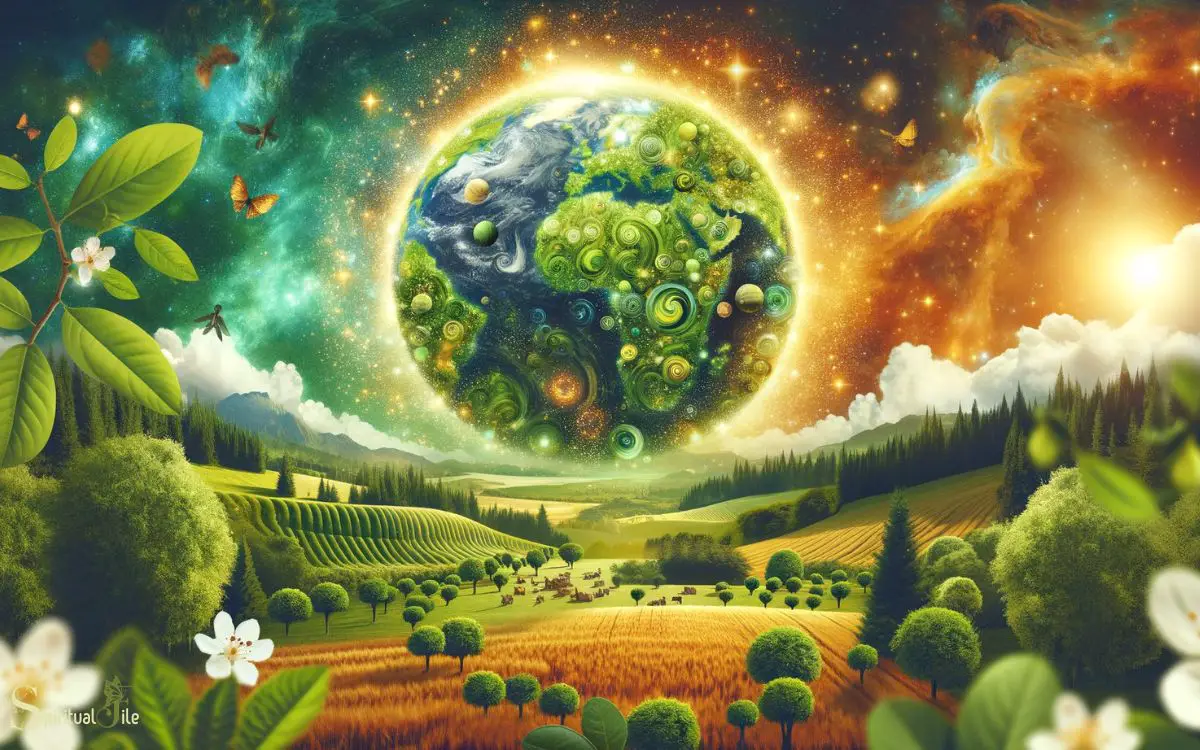
As a nurturer and provider, the Earth plays a vital role in sustaining life and fostering growth in various spiritual traditions and belief systems.
It is revered as a source of nourishment, offering sustenance for all living beings. In spiritual contexts, the Earth is often seen as a maternal figure, embodying the qualities of fertility, abundance, and care.
Many cultures view the Earth as a generous provider, offering not only physical sustenance but also spiritual nourishment.
This concept of the Earth as a nurturer and provider underscores the interconnectedness of all life and the importance of respecting and honoring the natural world.
Earth in Mythology and Ancient Beliefs
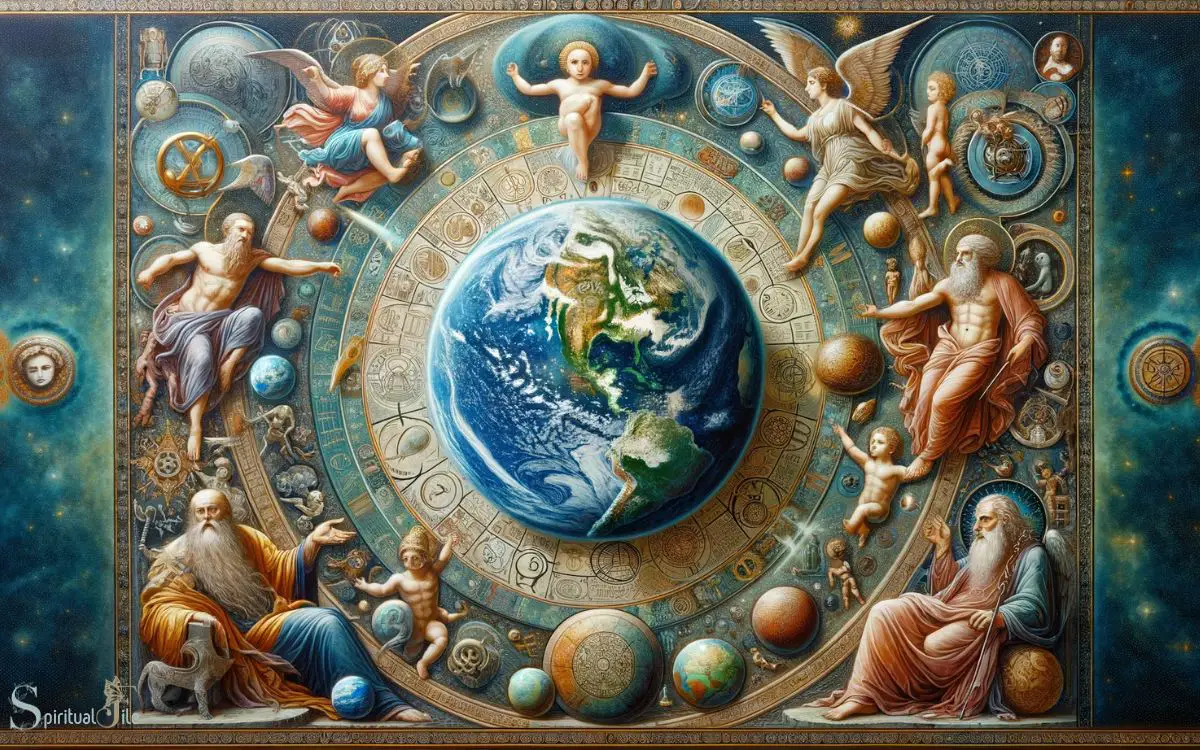
In various mythological and ancient beliefs, the Earth’s role as a nurturer and provider is further emphasized through its depiction as a significant deity or divine entity.
This portrayal is evident in diverse cultures and their mythologies, where the Earth is personified and revered as a powerful entity.
Greek Mythology:
- Gaia, the primal Greek goddess, personifies the Earth and is revered as the mother of all creation. She represents fertility, abundance, and the nurturing aspects of the Earth.
Norse Mythology:
- Jord, the Norse earth goddess, is honored as the embodiment of the Earth. She is viewed as the mother of Thor, highlighting her importance in Norse mythology and her association with fertility and protection.
These mythological representations highlight the profound spiritual significance attributed to the Earth, symbolizing its essential role as a nurturing and life-giving force in ancient beliefs.
Earth as a Symbol of Fertility and Growth
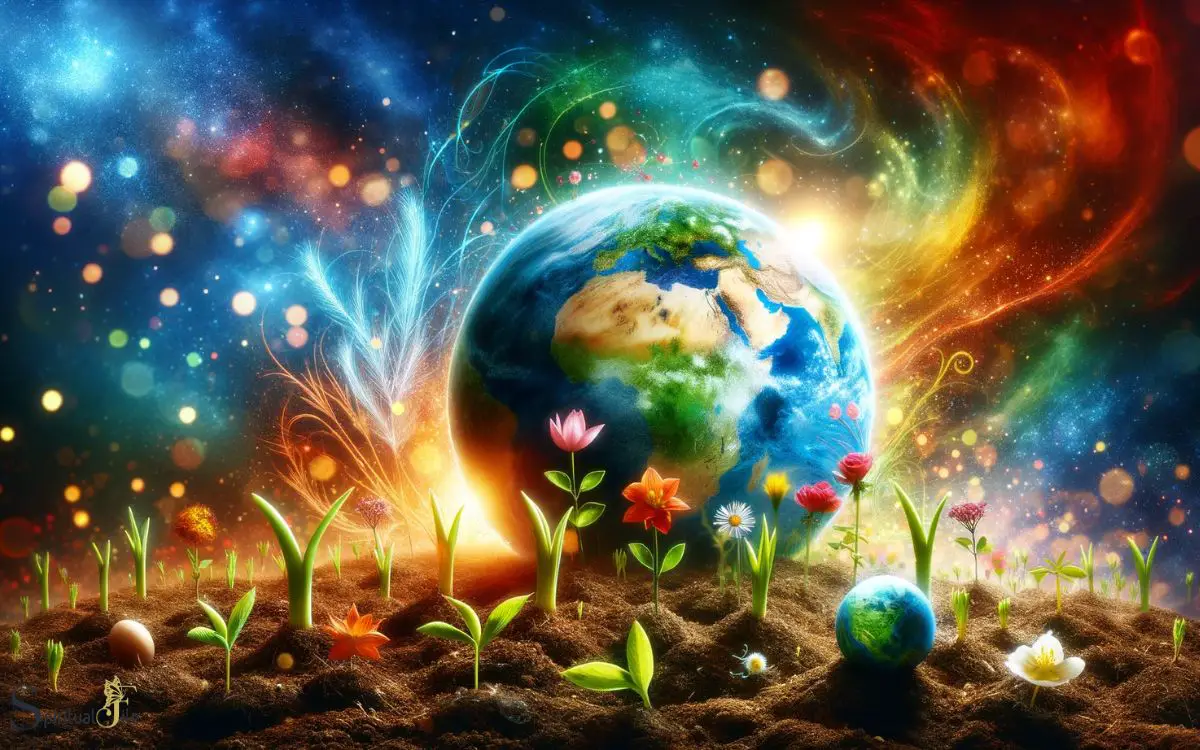
With its association with fertility and growth, the Earth holds profound spiritual symbolism across various cultures and belief systems. The Earth is revered as a symbol of fertility, representing the nurturing and life-giving qualities that sustain all living beings.
In many ancient and contemporary spiritual traditions, the Earth is seen as a mother figure, embodying the capacity to bring forth new life and abundance.
This symbolism is often depicted in agricultural rituals, ceremonies, and myths that honor the Earth’s role in sustaining life.
The Earth’s ability to support the growth of crops, plants, and all living organisms has led to its representation as a source of nourishment and vitality.
Earth in Astrology and Elemental Symbolism
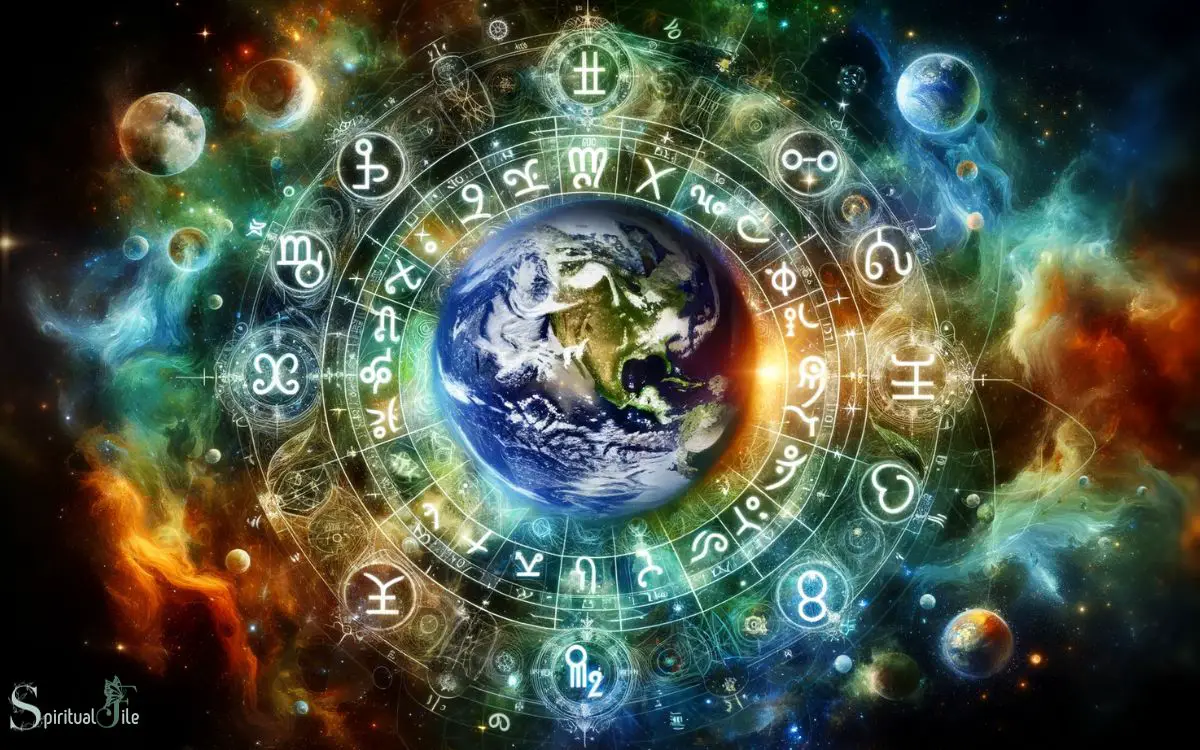
Earth plays a significant role in astrology and elemental symbolism due to its grounding and stabilizing influence.
In astrology, the Earth represents the material world, practicality, and physical manifestation. It is associated with the zodiac sign Taurus, which embodies stability, reliability, and sensuality.
In elemental symbolism, Earth is one of the four classical elements and is linked to the tangible aspects of life, such as the body, health, and the natural world.
Within the elemental framework, Earth is seen as a symbol of fertility, abundance, and nurturing. Its nurturing qualities are reflected in its representation of the fertile soil that supports growth and sustenance.
Earth in Indigenous and Shamanic Traditions

Embedded within indigenous and shamanic traditions, the Earth holds sacred significance as a source of wisdom, healing, and spiritual connection.
In these traditions, the Earth is revered as a living, breathing entity that provides nourishment for both the body and the soul.
It is seen as a source of spiritual guidance, offering insights and teachings through its natural elements and cycles.
Indigenous and shamanic communities honor the Earth through rituals, ceremonies, and practices that seek to maintain harmony and balance with the natural world.
The Earth is viewed as a wise and benevolent teacher, offering lessons in resilience, interconnectedness, and the cyclical nature of life.
This deep reverence for the Earth as a source of spiritual wisdom permeates through the rituals and beliefs of indigenous and shamanic cultures.
What is the significance of the spiritual symbolism of water compared to the symbolism of earth?
The significance of water symbolism in spirituality surpasses that of earth symbolism. Water is often associated with purification, cleansing, and renewal. It represents an essential element for life, evoking feelings of tranquility and transformation. In contrast, earth symbolism conveys stability and grounding, emphasizing the materialistic aspects of existence. While both hold importance, water symbolism resonates deeply within spiritual practices, offering a profound connection to emotions and the subconscious mind.
Earth as a Source of Spiritual Wisdom

Earth, as a source of spiritual wisdom, holds a profound significance in various cultural and spiritual traditions. It serves as a grounding force, connecting individuals to the deeper essence of life and spirituality.
Furthermore, the interconnectedness with the Earth fosters a sense of nurturing energy, offering valuable insights and wisdom for spiritual growth and enlightenment.
Earth as Grounding Force
Grounding is a fundamental aspect of spiritual wisdom, providing stability and connection to the present moment. This grounding force offers valuable insights and wisdom, serving as a source of spiritual guidance and support.
Consider the following aspects:
- Connection to the Earth Grounding techniques, such as mindfulness and meditation, foster a deep connection to the Earth, allowing individuals to draw strength and stability from its energy.
- Centering and Stability Grounding practices enable individuals to remain centered and balanced, promoting a sense of stability amidst life’s challenges.
This anchoring force not only provides a sense of rootedness but also facilitates the flow of spiritual wisdom and insight.
Spiritual Interconnectedness With Earth
The interconnectedness between humanity and the Earth is a profound source of spiritual wisdom and insight. Across various cultures and belief systems, the Earth is revered as a provider of not only physical sustenance but also spiritual nourishment.
This interconnectedness is deeply rooted in the understanding that the Earth is a source of spiritual wisdom, offering guidance, healing, and a profound connection to the divine.
Through the Earth, individuals can find grounding, clarity, and a deeper understanding of their place in the universe.
Here’s a various aspects of spiritual interconnectedness with Earth:
| Aspect | Description |
|---|---|
| Concept | The belief in a deep and spiritual connection between humans and the Earth. |
| Belief Systems | Found in various religious and spiritual traditions, including indigenous, Pagan, and eco-spiritual beliefs. |
| Gaia Hypothesis | The idea that the Earth is a living organism and that all life on the planet is interconnected. |
| Ecological Awareness | Encourages respect for nature, environmental stewardship, and sustainable living practices. |
| Rituals and Ceremonies | Practices such as earth-based ceremonies, meditation in natural settings, and seasonal celebrations. |
| Sacred Sites | Locations revered for their spiritual significance, often in natural settings like mountains, rivers, and forests. |
| Environmental Ethics | Emphasizes the importance of protecting the environment and treating the Earth as sacred. |
| Holistic Well-being | The belief that a harmonious connection with the Earth contributes to physical, mental, and emotional health. |
| Conservation Efforts | Spiritual interconnectedness can motivate people to engage in conservation and ecological restoration efforts. |
| Global Awareness | Recognizes that the well-being of the Earth is interconnected with the well-being of all living beings. |
Earth’s Nurturing Energy
With its nurturing energy, Earth exemplifies a profound source of spiritual wisdom, providing grounding, healing, and a deep connection to the divine, as previously discussed in the interconnectedness between humanity and the Earth.
Earth’s Nurturing Qualities:
- Grounding: The Earth’s stability and constancy offer a sense of rootedness, allowing individuals to feel centered and present in the moment.
- Healing: The Earth’s natural elements, such as plants, minerals, and water, possess therapeutic properties that promote physical, emotional, and spiritual well-being.
This nurturing energy extends beyond physical sustenance, offering spiritual nourishment and guidance to those who seek a deeper understanding of their place in the universe.
Through its nurturing essence, Earth serves as a constant reminder of the interconnectedness of all living beings and the importance of embracing the wisdom it offers.
Conclusion
Earth symbolizes stability, nurturing, fertility, and wisdom in various spiritual and cultural traditions. It is seen as the grounding force that provides sustenance and supports life.
Earth is deeply intertwined with mythology, astrology, and indigenous beliefs, representing the foundation of existence and the source of spiritual growth.
Its significance as a symbol of stability and growth serves as a reminder of the interconnectedness of all living beings and the importance of nurturing and caring for the planet.






